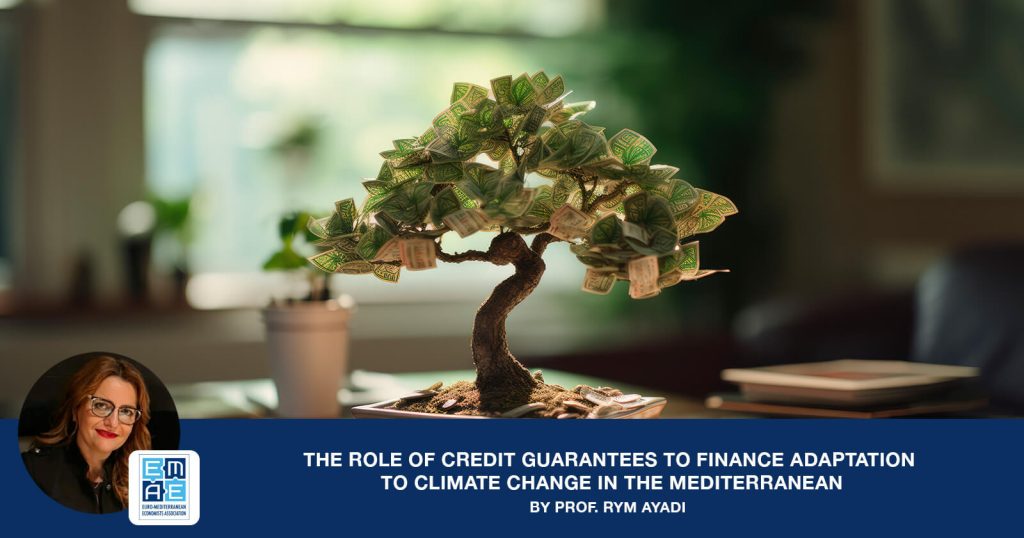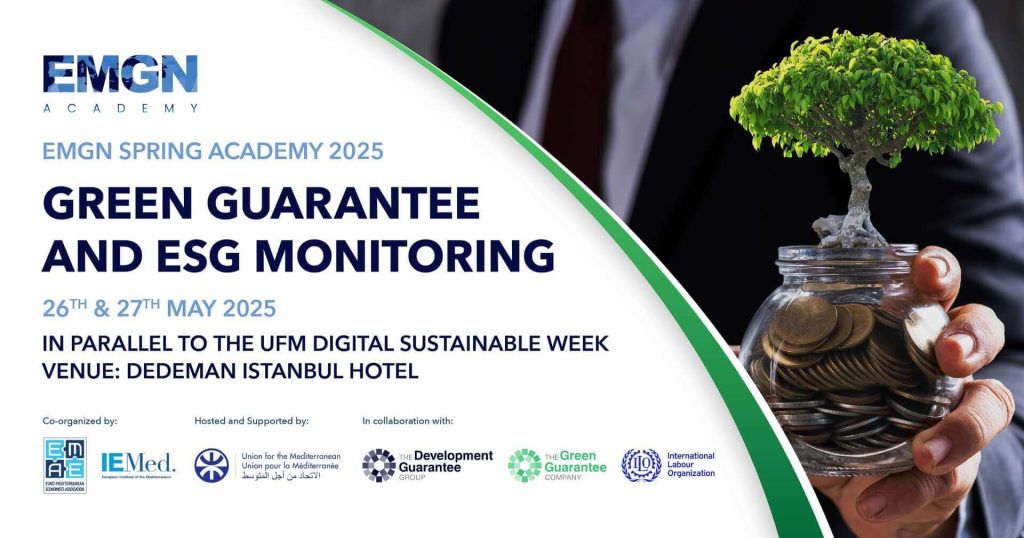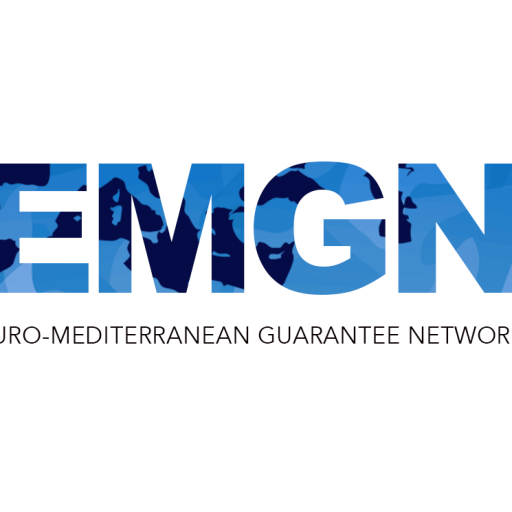
Posted on June 3, 2025
EMGN Academy 26 May 2025, Istanbul, Turkey
Speech By Prof. Rym Ayadi, President of the Euro-Mediterranean Economists Association (EMEA)

Climate change adaptation is an urgent priority for the Mediterranean region, characterized by its high vulnerability to climate-related impacts such as droughts, floods, heatwaves, and rising sea levels. Addressing these risks requires substantial investments in resilient infrastructure, agriculture, water management, and coastal protection. However, financing adaptation projects remains challenging due to perceived risks, limited public budgets, and constrained private investment.
Credit Guarantees as a Financial Mechanism:
Credit guarantees have emerged as a powerful instrument to mobilize private capital for climate adaptation. By reducing perceived risks, credit guarantees encourage financial institutions and private investors to engage in sectors and projects they might otherwise avoid due to uncertainty or lack of familiarity.
In essence, a credit guarantee scheme involves a guarantor (often a public institution or a multilateral development bank) agreeing to cover part of the losses if a borrower defaults. This arrangement significantly reduces the risk for lenders, thereby lowering interest rates and improving borrowing conditions, making financing accessible for adaptation projects.
Relevance for the Mediterranean Region:
In the Mediterranean, credit guarantees can play a pivotal role by:
- Catalyzing Private Sector Participation: Attracting commercial banks and investors to finance sustainable agricultural practices, resilient infrastructure, and water conservation technologies.
- Supporting SMEs and Farmers: Offering SMEs and smallholder farmers better access to finance for adopting climate-resilient practices and technologies.
- Leveraging Public Funds: Using limited public resources to leverage larger volumes of private investment, thus multiplying the overall investment capacity for adaptation.
Examples and Best Practices:
- European Investment Bank (EIB): The EIB has successfully utilized credit guarantees to mobilize substantial private investment in renewable energy projects across the Mediterranean. For example, the EIB-supported program “Green for Growth Fund” significantly improved energy efficiency and renewable energy capacity by providing guarantees that enabled local banks to extend financing to SMEs and municipalities.
- Tunisia’s PROSOL Program: This innovative program leveraged credit guarantees to finance residential and commercial solar water heaters. Supported by a partnership between the Tunisian government, UNEP, and local banks, PROSOL provided partial guarantees, reducing risks for banks and thus increasing access to financing for consumers.
- Morocco’s Agricultural Resilience Initiatives: Morocco employed credit guarantees through programs like the “Green Morocco Plan” which allowed smallholder farmers access to financing for sustainable agriculture techniques, irrigation improvements, and resilient crop varieties, thereby enhancing agricultural productivity and resilience.
- Egypt’s Water and Sanitation Projects: Credit guarantees backed by international financial institutions facilitated private sector involvement in large-scale infrastructure projects aimed at improving water management and sanitation, contributing significantly to Egypt’s climate resilience and public health goals.
Design of a Green Guarantee Instrument:
A specifically tailored green guarantee instrument for financing adaptation and mitigation in the Mediterranean should incorporate several key design features:
- Targeted Risk Coverage: Clearly defined criteria for eligible projects and sectors such as renewable energy, water conservation, resilient agriculture, and coastal protection to ensure funds directly contribute to climate resilience and mitigation goals.
- Flexible Guarantee Structures: Offering partial guarantees or first-loss guarantees tailored to different project scales and risk profiles, enhancing attractiveness to various types of investors, from local banks to international financiers.
- Performance-Based Incentives: Linking guarantees to environmental and social performance outcomes to ensure project alignment with climate objectives and to encourage continuous improvements in resilience and mitigation measures.
- Robust Monitoring and Evaluation Systems: Establishing transparent monitoring frameworks to track and report climate adaptation and mitigation impacts, thereby increasing accountability and confidence among investors and stakeholders.
- Capacity Building Component: Including technical assistance and capacity-building programs for financial institutions, project developers, and beneficiaries to ensure effective utilization of financial resources and sustained adaptation impacts.
Connecting Adaptation and Mitigation:
Adaptation and mitigation strategies, although distinct, often intersect and reinforce each other. For instance, investments in resilient agriculture practices like agroforestry simultaneously enhance carbon sequestration (mitigation) and reduce vulnerability to extreme weather events (adaptation). Similarly, sustainable urban infrastructure projects, such as green roofs and urban forests, not only reduce urban heat island effects (adaptation) but also absorb atmospheric carbon dioxide (mitigation). Renewable energy projects in water-scarce regions, such as solar-powered desalination plants, enhance water availability (adaptation) while significantly reducing reliance on fossil fuels (mitigation). Integrated projects addressing both adaptation and mitigation offer greater efficiency, optimize resource use, and maximize climate and developmental co-benefits.
Enhancing ESG and Accelerating SDGs:
Financing climate adaptation and mitigation through credit guarantees significantly enhances organizations’ Environmental, Social, and Governance (ESG) performance by directly addressing climate risks and promoting sustainability. Such financing aligns with investors’ increasing emphasis on ESG criteria, attracting more sustainable capital. Moreover, these financial mechanisms contribute directly to the acceleration of Sustainable Development Goals (SDGs), particularly those relating to climate action (SDG 13), clean water and sanitation (SDG 6), affordable and clean energy (SDG 7), and sustainable cities and communities (SDG 11), thereby promoting holistic, sustainable development across the region.
Roadmap for EMGN to Support Guarantee Schemes:
- Assessment and Benchmarking: Identify existing gaps and opportunities in regional guarantee schemes through comprehensive assessments and benchmarking exercises.
- Capacity Building: Develop tailored capacity-building programs for financial institutions and guarantee scheme providers, focusing on climate-related project evaluation and risk management.
- Networking and Collaboration: Strengthen collaboration among regional guarantee schemes through regular forums, workshops, and joint initiatives to share best practices and successful models.
- Technical Assistance Facility: Establish a regional technical assistance facility to support the design and implementation of specialized green guarantee products and to enhance institutional capacities.
- Policy Advocacy: Engage with policymakers to advocate for supportive regulatory frameworks that enhance the viability and scalability of climate-focused guarantee instruments.
- Monitoring and Impact Evaluation: Implement rigorous monitoring and evaluation systems to track the performance and impact of guarantees, ensuring continuous improvement and transparency.
Conclusion:
Credit guarantees represent a crucial, innovative approach to unlocking private finance for adaptation initiatives in the Mediterranean. By mitigating investment risks and leveraging additional private capital, these instruments not only enhance climate resilience but also contribute to broader economic and social development objectives across the region.
This statement is based on the welcome speech delivered by Prof. Rym Ayadi, “The Role of Credit Guarantees to Finance Adaptation to Climate Change in the Mediterranean,” at the Euro-Mediterranean Guarantee Network (EMGN) Spring Academy 2025, held on 26–27 May in Istanbul, Türkiye.
In her address, Prof. Ayadi emphasized that: “Credit guarantee schemes are essential levers to unlock private investment and bridge the financing gap in climate adaptation and mitigation. By effectively managing risk, aligning incentives, and enhancing ESG performance, they empower Mediterranean communities and businesses to build resilience, drive sustainable growth, and collectively accelerate the journey towards achieving the Sustainable Development Goals.”
The Spring Academy of 2025 was organised by the Euro-Mediterranean Guarantee Network (EMGN), led by the Euro-Mediterranean Economists Association (EMEA) and the European Institute of the Mediterranean (IEMED) in collaboration with the Development Guarantee Group, the Green Guarantee Company, and the International Labour Organization (ILO). The Academy is hosted by the Union for the Mediterranean (UfM) as a side event to the Sustainable Digital Week.
Link to Prof. Ayadi’s speech video



About The Author: Emgn_admin
More posts by emgn_admin